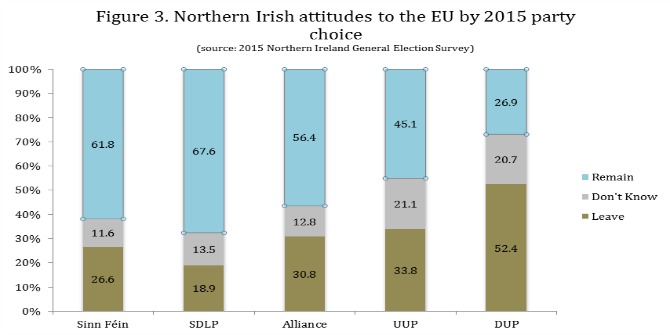 In times of uncertainty, politics is about choosing between competing narratives. The trouble is that narratives tend to be more about sticking to one’s position than responding to events. We need our politicians to be better at changing their stories and their minds, argues Kate Alexander Shaw.
In times of uncertainty, politics is about choosing between competing narratives. The trouble is that narratives tend to be more about sticking to one’s position than responding to events. We need our politicians to be better at changing their stories and their minds, argues Kate Alexander Shaw.
In the week since the Brexit referendum there has been plenty of hand-wringing about how ill-informed the British public were, and how shallow their understanding of the consequences of leaving the EU. One much-quoted poll suggests that over a million Leave voters might be experiencing buyer’s remorse, suggesting that many people were unclear about what, exactly, they thought they were voting for, and that the aftermath of the vote may be turning out very differently to their half-formed expectations. On the Remain side, there has been an upswell of anger toward both confused Leavers and the mendacious figureheads of the Leave campaign, whose willingness to float campaign slogans with little or no traction on policy is becoming infuriatingly clear.
Such anger, however, misses the fact that even the best-informed are interpreting Brexit in ways that confirm, rather than challenging, their existing positions. Across the political spectrum, the contest between different accounts of the crisis looks increasingly like a debate about who was right all along; to that extent, it will tend to deepen social fault lines rather than bridging them.
To understand the politics of uncertain times, we must come to grips with the fact that human beings think in stories, and that the first order of business in a crisis is to arrive at a narrative that makes sense of things. French psychologist Serge Moscovici argued that in an increasingly complex world, it is impossible for each of us, individually, to become expertly versed in everything that matters to us. Instead, “we think and see by proxy”, relying on others to deliver pre-packaged frameworks of understanding that we can buy into. This goes double for politics, where pret-a-porter thinking is the only way that all but the most committed policy nerds can get through the week. Understanding how such narratives work is therefore essential to understanding the political process. I suggest that political narratives have two important properties, each of which will be critical to how the post-Brexit period plays out.
First, narratives are all about converting uncertainty into politically actionable certitude. In politics, and especially in economic policy, there is rarely a simple, unarguable version of the facts on which everyone can agree. Uncertainty and disagreement are the norm, as was evident when the public rejected the Treasury’s modelling of post-Brexit scenarios as ‘scaremongering’. That economic uncertainty is now compounded by the political uncertainty around the process for leaving the EU. However, for political purposes, uncertainty is no good to anyone. It is impossible to launch a policy prospectus from a starting point of “we don’t know”, so narratives must project certainty even, or especially, when the facts are in doubt. The would-be leaders of the Conservative Party will now begin their campaigns by constructing narratives that define the problems we face, and offering solutions that make sense within the logic of those stories. In turbulent times, they will try to talk stability into being.
Second, because narratives are designed to master chaos, established political stories are highly resistant to change, even in the face of the most seismic events. This introduces huge confirmation bias, as political actors interpret an uncertain context in ways that fit their existing narratives. Following the referendum, examples of this abound:
- George Osborne’s statement on Monday argued that at least, thanks to his deficit reduction plan, “our economy is about as strong as it could be to confront the challenge our country now faces”. The counter-argument is that a country six years deep in public spending cuts may have been ripe for the anti-immigrant populism that found a home in the leave campaign. However, the idea that austerity may have helped create the Brexit “challenge” it now claims to mitigate would fundamentally contradict Osborne’s view of the world, and cannot therefore enter into his Brexit analysis.
- Jeremy Corbyn, on the other hand, responded to the referendum result by renewing his previous calls on the the government to suspend its fiscal rules in favour of increased public investment, a line which would have looked exactly the same at any point in his leadership. Corbyn’s insistence that his brand of leftwing critique commands a popular mandate looks increasingly shaky when large swathes of Labour’s heartlands voted against him in the referendum, but he continues to double-down on his established story with little reflection on the complex reasons for the Leave vote.
- Gordon Brown has argued that the Leave vote shows that “taming globalization” is now the critical policy question, and calls for a new consensus on the benefits of nations coming together to tackle, amongst other things, the threat of protectionism. While Brown is probably right that the go-it-alone economics of Brexit is unrealistic in the 21st century, his anti-protectionism narrative ignores the fact that one of the strongest arguments for staying in the EU is now to stay inside the protectionist cordon that has allowed Britain to develop its comparative advantage in banking. The financial services ‘passporting’ that has incentivised US and Asian banks to establish EU hubs, mainly in London, is nothing if not a protectionist exercise. But, this has never fitted with Brown’s long-standing vision for a pro-globalisation Europe, so it is absent from his Brexit story.
The point is not that all of these arguments are wrong, although they are certainly all contestable. It is simply that they show so little alteration in the face of events that one wonders if anyone has been paying attention. If the only lesson we ever draw from crisis is “I was right all along”, then we learn nothing at all.
The obvious counter-example is Boris Johnson, who has famously reversed his position on EU membership in order to head up the Leave campaign. He certainly demonstrated what could politely be termed rare political flexibility, but the consequence of his rhetorical about-turn is that he was less well placed than others to offer certainty in the face of crisis. It is difficult to build confidence on a foundation of changeability, especially when it is seen as motivated more by personal ambition than by serious reflection. In the event, it seems that project Boris failed the first test of narrative by failing to provide a refuge from uncertainty; Johnson’s withdrawal from the Conservative leadership contest illustrates that while having too rigid a narrative is problematic, so too is the absence of any conceptual stability at all.
Some would argue that the narratives are less important than the fundamentals, and that sorting out post-Brexit Britain means working out who is objectively right, and voting them into a position of power. I suggest that narrative is inescapable – it is how politics is done – but there is now a window of opportunity for new thinking to come through. The high proportion of ‘don’t knows’ in pre-referendum opinion polls points to a large constituency of people not satisfied by what was on offer a week ago, and who may be in the market for new political stories. If their only choice is between positions that existed before the referendum and are largely unaffected by it, then we will have gained nothing and will remain more divided, and more disaffected, than ever.
If the incumbent and incoming leaders of Britain’s political parties are serious about delivering unity, they must start by examining their own taken-for-granted positions, and asking themselves which parts of other people’s narratives they should consider taking on board. It is not enough for a political story to be stubborn in the face of events; it must at least attempt to engage with change, which means admitting the possibility of being wrong. Politics will always be about storytelling; the trick is to avoid the stories becoming a barrier to thought.
 Kate Alexander Shaw is a PhD candidate in the Department of Government, and a former Treasury official. She tweets from @KAlexanderShaw.
Kate Alexander Shaw is a PhD candidate in the Department of Government, and a former Treasury official. She tweets from @KAlexanderShaw.








Intetesting. For me the eu debate came down to the ongoing debate between community values and rights (communitarianism) and individual values and rights (liberalism) with the eu promoting a 20/80 mix. The referendum result produced a 52/48 mix and therefore due to community rights being seen as slightly more important than individual rights we left. Consequently any brexit settlement and future UK policy should (and will) reflect this 52/48 mix of community and individual rights.
For me and viewed from this perspective, a large part of those that wished to remain were actively trying to deny brexiters their community rights by castigating them as racist and xenophobic. This verbal abuse and oppression amounted to inciting hatred and has been happening for decades in that liberals have been actively suppressing communitarians whether through verbal abuse or economic impoverishment. Now that the communitarians have won the argument and asides from a small amount of revenge politics from hard core communitarians, the liberals still seem to be trying to get their (liberal) way by trying to contest the result. What is alarming about this anti-democratic behaviour is that these same anti-democratic tendencies have been apparent throughout their period of rule, whether through the eu or during this campaign. It makes me wonder to what extremes liberals will go to try and have their liberal way.
However the result will remain and so rather than more liberalism we are now entering a period of liberal communitarianism which reflects the 52/48 result as opposed to the communitarian liberalism that reflected the 20/80 mix of eu rule.
This is what Brexiters wanted and is now what we have got – a better balance between community and individual rights and responsibilities.
Great article. I wrote my MSc dissertation on crisis policy making and its pitfalls because of narratives and how they are framed by the media. The soundbite education of our electorate has played a huge role in the current policy environment.